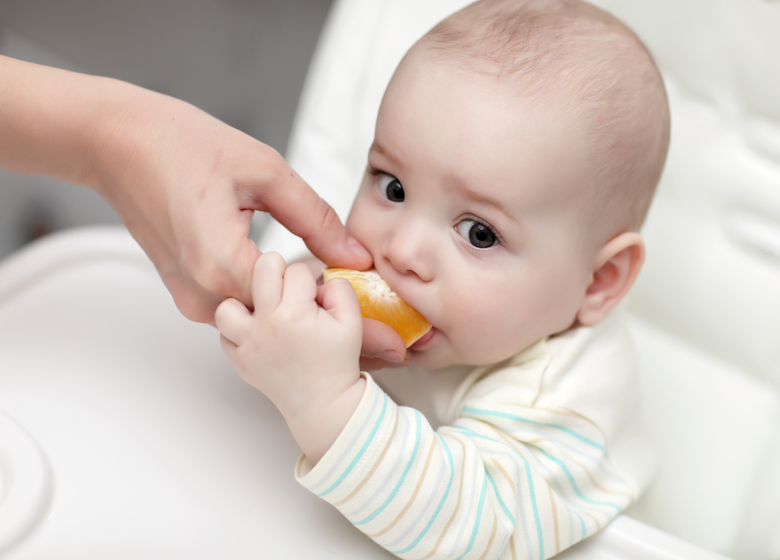Are Oranges good for babies?
At first glance, this might seem like an odd question. Why are we talking about oranges in particular? What makes them different from any other fruit you might feed your baby?
Well, when you think about it, they’re different in quite a lot of ways. Oranges, unlike bananas, pears, or melons, are a pulpy, stringy, citrus fruit. Those factors make a difference in when and how you should feed it your baby for the first time.
When should you introduce Oranges to your baby?
Its good to introduce new nutrition filled things to your babies like vegetable, fruits, dry fruits etc. Although the introduction of oranges into baby food has been one of the areas of concern for mothers, pediatric nutritionists as well, because orange belongs to the citrus family and citrus fruits can cause allergies in babies.
The most common age recommended for the introduction of citrus fruits is around 12 months. You want to be sure that your baby is older and successfully chewing foods before introducing oranges. Though pediatricians no longer recommend delaying a child’s exposure to foods to prevent allergies — in fact, it seems that eating some foods earlier may help prevent some reactions — the issue with oranges and other citrus fruit is not just possible allergies, but also the reaction that babies can have to the acidity and the risk of choking.
Nutritional Facts of Orange
A general medium-sized orange consists of:
Constituent Quantity
- Potassium – 232 mg
- Phosphorous – 32 mg
- Magnesium – 15 mg
- Calcium – 50 mg
- Sodium – 2 mg
- Iron – 0.18 mg
- Vitamin A – 346 IU
- Vitamin C – 82 mg
- Thiamine – 0.09 mg
- Riboflavin – 0.07 mg
- Niacin – 0.59 mg
- Folate – 0.48 mg
It also contains small quantities of copper, zinc, and manganese.
Benefits of a Oranges for your child
Orange is not only a tasty fruit but, it also offers numerous health benefits. Some of these health benefits are especially helpful for children and infants. Some of the health benefits include:
1.They’re a super source of vitamin C.
Citrus fruits are famous for their abundance of vitamin C, a potent antioxidant. This is certainly one of the biggest benefits of consuming citrus. Of all citrus, oranges have the most vitamin C per gram. A large orange (about 3 inches in diameter) has 150 percent of the recommended daily intake of vitamin C.
2. It’s all about the potassium.
Citrus fruits are a decent source of minerals including calcium, magnesium, and phosphorus. But where they really shine is with potassium, an important mineral for the heart.
3. They contain soluble fiber.
Another major benefit of citrus fruits is they’re jam-packed with fiber. A large orange has roughly four grams. Fiber is a great source of nutrition. It helps prevent digestive issues like bloating and diarrhea and can ease constipation in kids. Fiber also makes them stay fuller for longer, which aids in weight management.
4. They don’t spike blood sugar.
Unlike birthday cake and fruit snacks, which jack up kids’ blood sugar, fresh fruit like citrus satisfy their sweet tooth without causing the parent-dreaded “sugar high” — or the awful crash that comes next. Thanks to the fiber in citrus, these fruits take longer for the body to digest than processed sweets, so the sugar is absorbed slowly instead of hitting them fast and making them crazy. Keeping children’s blood glucose balanced lowers their risk of unnecessary weight gain and heart problems.
5. They’re full of flavonoids
Hesperidin is the type of flavonoid present in Orange. It occurs only rarely in other plants and are thus essentially unique to citrus. These naturally occurring plant compounds are potent antioxidants that tame inflammation, protect against cancer, and safeguard the brain. Flavonoids also help hearts stay healthy by lowering bad cholesterol, steadying blood glucose and lowering triglycerides.
6. They’re easy to eat.
Just put them where they are visible, such as in a bowl on the counter or front and center in the fridge. You can even cut them up and quarter them ahead of time so they’ll be even more likely to snack on them.
7. You can start kids on citrus young
Parents can introduce whole citrus fruits as soon as children start on whole foods, usually around 12 months. An easy segue into citrus fruits is mandarin oranges because they are easy for little kids to pick up and easier to chew because they are soft and don’t have a tough skin.
8. Reduces Cold And Cough Trouble
Children often suffer irritation and weakness due to cold and cough. Oranges serve as one of the best remedies for minimizing these troubles. Also, medicinal properties of oranges protect your child from harmful secondary infections that come along with a cough and cold.
9. Speeds Up Recovery From Typhoid Infection
Typhoid occurs due to the growth of Salmonella typhi bacteria, which is a highly contagious microbe. Your kids suffer from a headache, chronic abdominal pain, and cough when they are down with thyroid. The infection also hampers the digestive power of children, and they can only have easily digestible liquids and foods. And, drinking fresh orange juice serves as one of the best remedies to speed up children’s recovery as it offers them all the lost nutrients.
10. Improves Vision
Oranges are a rich source of vitamin A, flavonoids, phytonutrients, such as alpha and beta carotenes, lutein, beta-cryptoxanthin, and nutrients that help maintain healthy skin and mucous membrane of your kid’s eye. The consumption of citric acid also enhances your child’s vision and eye health significantly.
11. Curbs Gum Bleeding And Tooth Loss
Vitamin C plays a vital role in the production of collagen in your kid’s body. Collagen is a crucial element of bones, tendons, blood vessels, and ligaments. A deficiency of vitamin C can make your child suffer from symptoms of scurvy, such as gum bleeding, tooth loss, acute pain in the joints, and easy bruising. Give your kids fresh orange slices, as they serve as a natural and effective solution for eliminating the symptoms and hazards of scurvy.
12. Eliminates Diarrhea
Severe diarrhea can prove hazardous for your kid’s health. Giving kids fresh orange juice regularly can help alleviate the symptoms of diarrhea substantially. Dilute freshly extracted orange juice with water up to 50% and provide it to your kid to help him obtain great relief from the digestive disorders.
How To Choose And Serve Quality Oranges For Kids In A Healthy Way?
To help your child enjoy eating a fresh orange without any hassles, you need to follow certain tips that will ensure your child enjoy quality fruit safely.
- Choose Sweet Oranges Only: Make sure you provide your kids only sweet oranges as they are good to taste than sour oranges.
- Get A Firm Orange: Ensure that the orange is ripe. Examine all the sides of the fruit from all directions. If you come across any soft spots, then avoid that orange.
- Remove Peels, Fiber, And Seeds: Choose an orange that is easy to peel. Remove the fibers which surround the orange’s flesh. Also, remove all tiny seeds within the orange so that your kid has trouble-free experience while eating oranges.
- Mash The Orange: If your child finds it difficult to eat an orange, then you can mash the flesh and make it easy for your child to eat the fruit.
- Do not give kids orange juice on an empty stomach as the citric acid content in the drink can make them suffer from acidity.
- Use straw to drink the orange juice, as the acids in the juice can harm your kid’s tooth enamel and erode it.
Introducing new foods to your child is one of the pleasures of that first year of parenting. Sometimes a few extra precautions are needed to make sure that your little one can enjoy them safely.
Also read – Gripe water for babies and New-born
Know the benefits of Coconut water for babies













